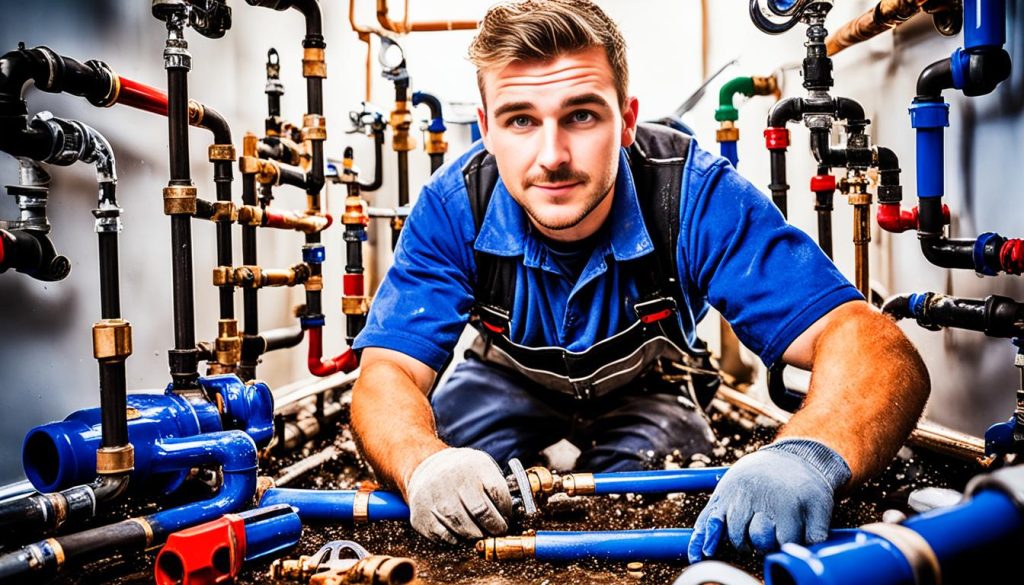Duration of Plumbing School: An Overview
Did you know that the duration of plumbing school can vary depending on the program chosen? If you’re considering a career in plumbing, it’s essential to understand the time commitment required to gain the necessary skills and knowledge. Whether you opt for a preparatory program or an apprenticeship, the duration of your training will play a crucial role in your journey toward becoming a licensed plumber.
Key Takeaways:
- Plumbing programs in Ontario colleges are offered as preparatory overview programs or apprenticeship programs.
- Preparatory programs are one-year certificate programs providing an overview of the plumbing field.
- Apprenticeship programs can last for two or three semesters and include both theory and hands-on training.
- A plumber apprenticeship typically takes four years, consisting of four 12-month periods.
- Completing a plumbing program is mandatory to become a licensed plumber in Canada.
Preparatory Plumbing Programs
Preparatory plumbing programs in Ontario colleges are one-year certificate programs. These programs provide classes in plumbing theory and practice to prepare students for a plumbing apprenticeship. The curriculum may include courses on plumbing tools and piping methods, trade documentation, welding skills, and safety techniques.
By enrolling in a preparatory plumbing program, students gain a solid foundation in the fundamentals of the plumbing trade. They learn about the theory behind plumbing systems, including how to read blueprints, interpret building codes, and understand plumbing principles. Additionally, students receive hands-on training to develop practical skills in plumbing installation, repair, and maintenance.
Throughout the program, students are introduced to various plumbing tools and equipment commonly used in the field. They learn how to effectively use these tools and apply proper techniques for different plumbing tasks. Understanding the correct use of tools is essential for carrying out plumbing work safely and efficiently.
In addition to learning about plumbing theory and practice, students in preparatory programs also receive instruction on piping methods. They learn how to install and connect different types of pipes, fittings, and fixtures, ensuring proper water flow and drainage. By gaining familiarity with different piping materials and methods, students are well-equipped to handle a range of plumbing projects.
Furthermore, preparatory plumbing programs cover trade documentation, which includes learning how to interpret plumbing codes, blueprints, and specifications. Students also develop essential skills in communication and teamwork, as these are crucial for collaborating with other professionals on construction sites or working as part of a plumbing crew.
Overall, preparatory plumbing programs provide aspiring plumbers with a comprehensive understanding of the plumbing trade. The combination of theoretical knowledge and practical skills gained through these programs lays a strong foundation for students’ future success in the industry.
| Topics Covered in Preparatory Plumbing Programs | Skills Developed |
|---|---|
| Plumbing theory and practice | Installation, repair, and maintenance of plumbing systems |
| Plumbing tools and equipment | Proper use and techniques for different plumbing tasks |
| Piping methods | Installation and connection of pipes, fittings, and fixtures |
| Trade documentation | Interpreting plumbing codes, blueprints, and specifications |
| Welding skills | Joining metal pipes using welding techniques |
| Safety techniques | Ensuring personal and occupational safety in plumbing work |
Apprenticeship Plumbing Programs
Apprenticeship plumbing programs in Ontario colleges are designed to cater to students who are already apprentices in the field. These programs provide a comprehensive training experience that combines both theory and hands-on learning.
During the two to three semesters of the program, apprentices will have the opportunity to enhance their knowledge of plumbing theory, which is similar to what is taught in preparatory programs. However, what sets the apprenticeship programs apart is the emphasis on practical experience through fieldwork. This hands-on training allows apprentices to apply the knowledge gained in the classroom to real-world scenarios, honing their skills and preparing them for the challenges of the plumbing industry.
To become a licensed plumber, completion of either a preparatory program or an apprenticeship program is mandatory. By combining in-class training with fieldwork, apprenticeship plumbing programs provide a comprehensive and well-rounded education that equips graduates with the skills and knowledge necessary for success in the plumbing profession.
Duration of Apprenticeship
The duration of a plumbing apprenticeship is typically four years, divided into four 12-month periods. Throughout each period, apprentices undergo a combination of on-the-job training and classroom instruction to develop the necessary skills and knowledge for a successful plumbing career.
On-the-Job Training: Apprentices are required to complete a minimum of 1560 hours of on-the-job training during each 12-month period. This hands-on experience allows apprentices to apply the theoretical knowledge they acquire in the classroom to real-world plumbing scenarios. Through practical tasks and supervised work, apprentices gain valuable skills in installing, repairing, and maintaining plumbing systems.
Classroom Instruction: In addition to on-the-job training, apprentices also participate in eight weeks of classroom instruction per year. These classroom sessions provide a structured learning environment where apprentices can delve deeper into plumbing theory. Topics covered include workplace safety, metal fabrication, drainage systems, heating systems, and electrical components. The combination of on-the-job training and classroom instruction ensures a comprehensive understanding of plumbing principles and practices.
Throughout the apprenticeship program, apprentices receive guidance and mentorship from experienced professionals in the industry. This support helps them to refine their skills, gain confidence, and prepare for the challenges they may encounter as licensed plumbers.
Completing the apprenticeship program is a crucial step towards becoming a licensed plumber. It equips apprentices with the necessary competencies and qualifications to excel in the plumbing industry and pursue various career opportunities.
| Period | On-the-Job Training (hours) | Classroom Instruction (weeks) |
|---|---|---|
| 1 | 1560 | 8 |
| 2 | 1560 | 8 |
| 3 | 1560 | 8 |
| 4 | 1560 | 8 |
General Requirements for Plumbing Programs
To enroll in a plumbing program, there are specific requirements that students need to meet. These requirements ensure that students have the necessary skills and knowledge to succeed in their plumbing education and future careers.
Ontario Secondary School Diploma
One of the primary requirements for plumbing programs is having an Ontario Secondary School Diploma (OSSD) or its equivalent. This diploma demonstrates that students have completed their secondary education and have a foundational understanding of various subjects.
Having an OSSD is essential because it shows that students have met the educational standards set by the province. This ensures that they have the necessary literacy, numeracy, and critical thinking skills to excel in their plumbing courses.
In addition to the OSSD, some plumbing programs may also require students to have a grade 12 English credit. This requirement emphasizes the importance of effective communication skills in the plumbing field, as plumbers often need to interpret blueprints, communicate with clients, and provide clear instructions to their colleagues.
Apprenticeship Registration
For students interested in apprenticeship plumbing programs, another requirement is registering with the Ministry of Advanced Education and Skills Development. Apprenticeship registration is mandatory to formalize your status as an apprentice and gain access to the necessary training and certification processes.
| Requirements for Plumbing Programs |
|---|
| Ontario Secondary School Diploma (OSSD) or equivalent |
| Grade 12 English credit (in some cases) |
| Apprenticeship registration with the Ministry of Advanced Education and Skills Development |
By registering as an apprentice, students can officially begin their journey toward becoming a licensed plumber. This registration process ensures that individuals are properly trained and regulated within the industry, promoting safety and professionalism.
It’s worth noting that some plumbing programs may have additional requirements, such as prior experience in the trade. This requirement ensures that students entering the program have a basic understanding of plumbing concepts and are committed to pursuing a career in the field.
Meeting these requirements is crucial for admission into plumbing programs and sets the foundation for a successful career in the plumbing industry.
Plumbing Jobs and Salaries
As a licensed plumber, there are a variety of career paths available to you. You can choose to specialize in residential plumbing, working on homes and apartments, or you can venture into commercial plumbing, servicing office buildings and retail spaces. If you’re interested in more challenging projects, industrial plumbing may be the right path for you, where you can work on large-scale systems like factories and manufacturing plants.
While starting salaries for entry-level or apprenticing plumbers can be as low as $25,000 per year, with experience and certification, you can expect your average annual income to be closer to $50,000. Keep in mind that union plumbers often earn higher salaries, with some professionals reaching up to $70,000 per year.
Working as a plumber also offers opportunities to collaborate with plumbing companies involved in construction and development projects. This can provide valuable experience and networking opportunities as you establish yourself in the industry. Alternatively, you may choose to build your own clientele as an independent contractor, enjoying the flexibility and potential for growth that comes with being your own boss.
Source Links
- https://www.ontariocolleges.ca/en/programs/professions-and-trades/plumbing
- https://catalogue.rrc.ca/Programs/WPG/Fulltime/PLU5F-CT
- https://www.sait.ca/apprenticeships-and-trades/programs/plumber
- Investing Wisely: How Windows & Doors in Boost Property Value and Financial Health - April 24, 2025
- The Financial Impact of Personal Injuries: Why Legal Help Matters for Business Owners - April 16, 2025
- The Hidden Financial Costs of Domestic Assault: What Business Owners Need to Know - April 16, 2025













